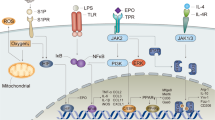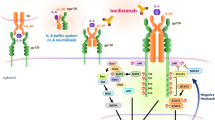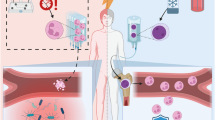Abstract
Interleukin 11 (IL-11) is a pleiotropic cytokine with biological activities on many different cell types. Recombinant human IL-11 (rhIL-11) is produced by recombinant DNA technology in Escherichia coli. Both in vitro and in vivo, rhIL-11 has shown effects on multiple hematopoietic cell types. Its predominant in vivo hematopoietic activity is the stimulation of peripheral platelet counts in both normal and myelosuppressed animals. This activity is mediated through effects on both early and late progenitor cells to stimulate megakaryocyte differentiation and maturation. rhIL-11 has been approved for the treatment of chemotherapy-induced thrombocytopenia. The hematopoietic effects of rhIL-11 are most likely direct effects on progenitor cells and megakaryocytes in combination with other cytokines or growth factors. rhIL-11 also induces secretion of acute phase proteins (ferritin, haptoglobin, C-reactive protein, and fibrinogen) from the liver. The induction of heme oxidase and inhibition of several P450 oxidases have been reported from in vitro studies. In vivo, rhIL-11 treatment decreases sodium excretion by the kidney by an unknown mechanism and induces hemodilution. rhIL-11 also exhibits anti-inflammatory effects in a variety of animal models of acute and chronic inflammation, including inflammatory bowel disease, inflammatory skin disease, autoimmune joint disease, and various infection-endotoxemia syndromes. rhIL-11 has trophic effects on non-transformed intestinal epithelium under conditions of mucosal damage. The mechanism of the anti-inflammatory activity of rhIL-11 has been extensively studied. rhIL-11 directly affects macrophage and T cell effector function. rhIL-11 inhibits tumor necrosis factor-alpha (TNFα), interleukin 1β (IL-1β), interleukin 12 (IL-12), interleukin 6 (IL-6), and nitric oxide (NO) production from activated macrophages in vitro. The inhibition of cytokine production was associated with inhibition of nuclear translocation of the transcription factor, nuclear factor kappa B (NF-κB). The block to NF-κB nuclear translocation correlates with the ability of rhIL-11 to maintain or enhance production of the inhibitors of NF-κB, IκB-α and IκB-β. In addition to effects on macrophages, rhIL-11 also reduces CD4+ T cell production of Th1 cytokines, such as IFNγ induced by IL-12, while enhancing Th2 cytokine production. rhIL-11 also blocks IFNγ production in vivo. The molecular effects of rhIL-11 have also been studied in a clinical trial. Molecular analysis of skin biopsies of patients with psoriasis before and during rhIL-11 treatment demonstrates a decrease in mRNA levels of TNFα, IFNγ and iNOS. These activities suggest that in addition to its thrombopoietic clinical use, rhIL-11 may also be valuable in the treatment of inflammatory diseases. The clinical utility of the anti-inflammatory properties of rhIL-11 is being investigated in patients with Crohn’s disease, psoriasis and rheumatoid arthritis. These diseases are believed to be initiated and maintained by activated CD4+ Th1 cells in conjunction with activated macrophages.
This is a preview of subscription content, access via your institution
Access options
Subscribe to this journal
Receive 12 print issues and online access
$259.00 per year
only $21.58 per issue
Buy this article
- Purchase on Springer Link
- Instant access to full article PDF
Prices may be subject to local taxes which are calculated during checkout
Similar content being viewed by others
Author information
Authors and Affiliations
Rights and permissions
About this article
Cite this article
Schwertschlag, U., Trepicchio, W., Dykstra, K. et al. Hematopoietic, immunomodulatory and epithelial effects of interleukin-11. Leukemia 13, 1307–1315 (1999). https://doi.org/10.1038/sj.leu.2401514
Received:
Accepted:
Published:
Issue Date:
DOI: https://doi.org/10.1038/sj.leu.2401514
Keywords
This article is cited by
-
Traumatic inflammatory response: pathophysiological role and clinical value of cytokines
European Journal of Trauma and Emergency Surgery (2023)
-
Role of interleukins in the pathogenesis of pulmonary fibrosis
Cell Death Discovery (2021)
-
Expert consensus on the diagnosis and treatment of thrombocytopenia in adult critical care patients in China
Military Medical Research (2020)
-
Antiviral activity of interleukin-11 as a response to porcine epidemic diarrhea virus infection
Veterinary Research (2019)
-
The effect of recombinant human thrombopoietin (rhTPO) on sepsis patients with acute severe thrombocytopenia: a study protocol for a multicentre randomised controlled trial (RESCUE trial)
BMC Infectious Diseases (2019)



